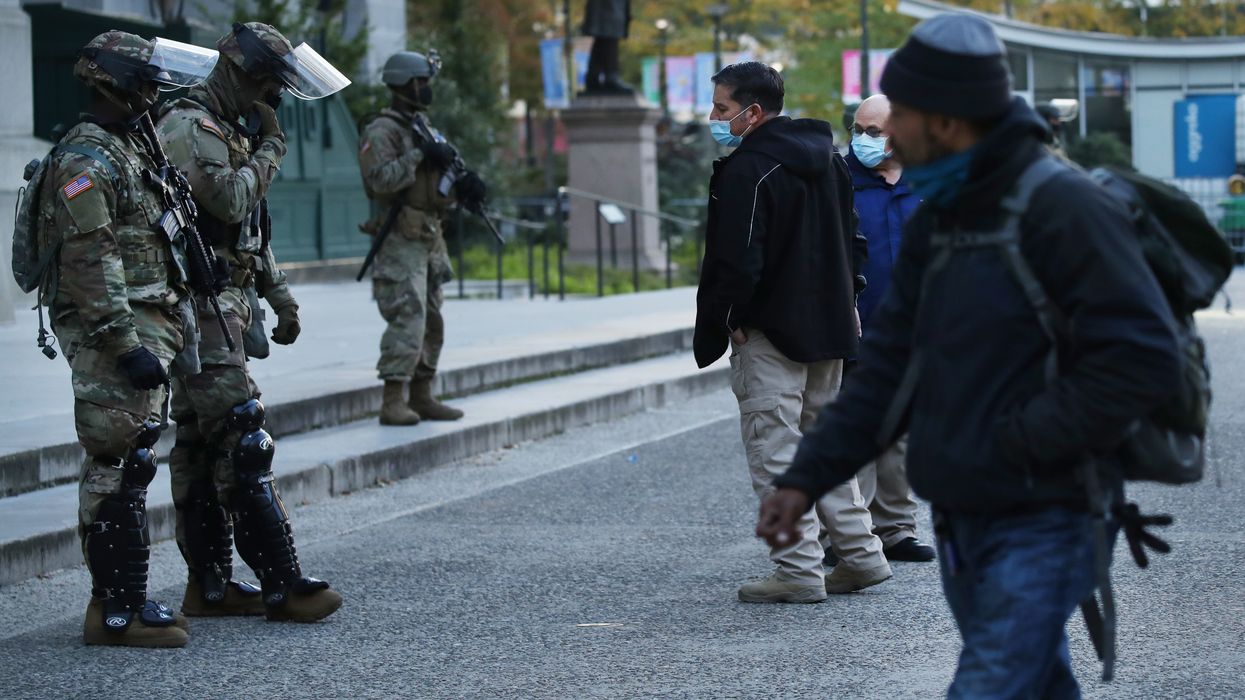Election Day passed with remarkably little drama. After months of anxiety, that's a relief. Even better, there has been extraordinarily little violence or threat of violence to mar the election itself. Those of us concerned about political violence will now worry about the aftermath.
On the positive side: The evening before the election, the Department of Homeland Security's inspector general declared illegal the department's deputization of Immigration and Customs Enforcement, Customs and Border Protection and other DHS employees to Portland in August. The timing suggests the IG wanted to get the warning out before the election, to preclude the possibility of further Portland-like deployments in the post-election period. These are missions that could take DHS into territory that would appear partisan.
Similarly, Reps. Ted Lieu of California and Kathleen Rice of New York, from the House Judiciary and Homeland Security committees, asked DHS about any planned post-election deployments, requesting detailed understanding of rules of engagement, authorities, and plans. That the DHS inspector general and members of Congress felt the need to warn about unlawful activities is worrisome. That they did it anyway shows patriotism.
Meanwhile, our active duty military got in front of rumors with a highly unusual call this weekend to news anchors representing channels from across the political spectrum. The chairman of the Joint Chiefs reportedly told journalists in the off-the-record briefing that the active duty military would have no role in a transition of power.
The chief of the National Guard Bureau also explained to journalists that some units have already been activated at the behest of governors. Some soldiers worked without uniform, as normal poll volunteers, under strict National Guard guidelines. Others have been working to ensure cybersecurity of their states' elections.
Still others have been activated, in uniform, in case of civil unrest. Since uniformed military on U.S. streets can frighten some people, the National Guard needs to make sure the public understands their presence isn't a cause for alarm. Forces activated so far haven't been federalized. Under their governor's command they are fulfilling proper and normal missions. Should there be post-election unrest, the Guard generally backfills jobs like traffic control so local law enforcement can handle protests and counter-protests.
The U.S. military is highly respected for its apolitical, professional role, and it does not want to be politicized. They are well aware of laws that specifically prohibit interference in elections and vote counting, and want to stay well on the right side of those laws.
That does not mean we should remain sanguine. Governors may attempt to politicize the National Guard. But the Guard today is not what it was in the 1960s. While these citizen-soldiers come from their states and communities, most have been deployed in wars overseas, where they served under the professional norms of active-duty troops. We can hope they imbibed some of those nonpolitical norms. Meanwhile, Guard units' military police are trained in civil unrest, unlike many in local law enforcement. DHS may try to circumvent laws and the IG alert in ways that further tarnish its reputation. Doing so could make the public believe DHS serves a party, not a country. That would politicize its long-term survival.
Finally, the clear bad news is that the election has fallen into our expected, but worst-case scenario. It's a close call that may shift from red to blue, after the president has declared victory. It may take days to count all the ballots. It may take even longer to work through litigation challenging the counts. According to multiple polls, voters on both sides of the aisle expect their candidates to win, and they believe if their side loses, it will be because of fraud. That underlines the likelihood of protests and counter-protests.
If police can't deescalate protests, violence may grow. And for some politicians, such citizen-on-citizen violence could serve as an excuse to crack down with curfews and other tactics that are known to escalate situations. Such escalation tends to play into the hands of "strongmen" leaders, to whom citizens turn in the face of violence. We can hope it doesn't come to this.
There is a great deal to celebrate about the election. Despite all fears and prognostication to the contrary, a record number of Americans cast their votes peacefully and easily. And, thanks to early voting and mail-in voting, we even avoided the long lines that have become such a feature in recent elections. Let us hope that this good news can carry through to a potentially more confusing post-election period.
Rachel Kleinfeld is a senior fellow at the Carnegie Endowment for International Peace. Read more from The Fulcrum's Election Dissection blog.



















